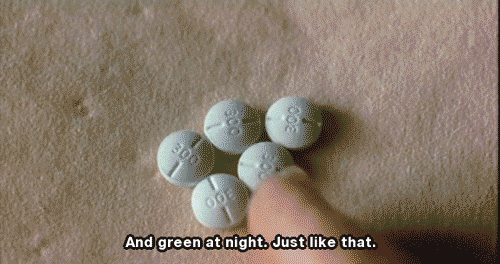Gotta love a good diet article that lures you with a cliché like “size matters”. But I’ll bite.
And if you just covered your chorizo when I said that, then great.
We’re already doing better than the status quo.

Sadly, the status quo is a big part of the problem when it comes to changing bad habits of the diet genre. Sadder still, is when science feeds into it with a story about portion-control rebranded and packaged into something they call “virtue-vice” bundles. Actually, it’s worse than portion control because it’s saying that adding in fresh healthy stuff somehow cancels out that pink meat-goop you gulp between bread buns that leave between your flesh buns like a fiery toilet water kamikaze – but not before murdering your insides.
Are we so bad that science has to set the bar this low? (“If you finish all your brussels sprouts, Billy, then you can have some dessert.”) What are we? Children?!
Did you just read that in Zoolander voice? Yes? Good. But like during Zoolander’s pre-model humble beginnings, some people have a sitch where they simply can’t afford fresh food all the time. I get that. So while I adore the idea of adding apples to value meals for people who are too poor for more than the fast food life, I feel like there are good yes-and options we could be providing to help them out.

I like your enthusiasm, boys, but… let’s keep brainstorming.
PRODUCE FOR PO’ FOLK
For instance, I like the idea of urban public gardens I’ve heard about before – it’d be an awesome way to raise health in poverty stricken regions and create a planetary-relache by understanding where the food we eat comes from by raising them from the ground up. Also, I’d like to take it a step further. Like, wouldn’t it be cool if they had “Nursey-nurseries”? A place where hard working parents can drop their kids off to be cared for all day, while their children learn how to connect with the earth, plant plants, and take some produce home? While the kids are cultivating natch noms, they’ll also be cultivating and awareness and mayhaps a passion for later in life. Plus, it always feels good to know you’re contributing to your family unit in some way.
As for the rest of Americans doing alright enough to have basic needs met, there’s less of an excuse. If you reduce health to a hell-heaven ratio status, then our fat asses only going to eat more of everything so that we can get a taste bud BJ from B&J ice cream later with a ladle in our La-Z-boy.

COGNI-NOM DISSONANCE
The emotional deficit is what’s being missed here.
We chronically gorge when something’s not going right, we want bad food ‘cause our tongues dig the faux flavoring it’s covered in, and we’re willing to ignore that we’re poisoning our bodies with that food after we become addicted to that fake taste. When you’ve learned your diet is detrimental and still do it anyway, how is that not self-abuse? And what kinda person – other than one who is a bit head-sick and addicted – is willing to carry on self-abusing?
Well… a lotta us.

‘cause as my second favorite Cranberries album title asked, “Everyone else is doing it so why can’t we?” Thus, status quo seems to be the ideal revival river in which to bathe our cognitive dissonance sins about how we McLive our lives.
The problem is – status quo ain’t healthy.
And we all know it. But we hide it away like Cinderella when the prince comes to visit with a shoe that won’t fit our feet ‘cause we’re too fat from lying to ourselves. And much like Cindy sans a fairy godmama, change is hard. Quitting milk products was way harder for me than quitting meat, but after three days, I didn’t even remember what they were like much less miss them. Why? ‘cause I felt awesome. It’s the getting through those few days that’s hardest. And that takes willingness. Can we do a scientific study on willingness and not-being-an-obstinate-self-sabotaging-asshole? Can we realize that adding greens after a heart attack sammich is like Ted Bundy working the suicide hotline after lady-murdering all night?
And that we still have to stop committing self-murder meals against ourselves?
Not tell ourselves an apple (likely slathered in Jiffy) cancels out all-you-can eat grease?

You might feel angry and confused.
Which is why I’m here to help.
For example, I see at least three additional solutions to the “virtue-vice” thing
PALM FLOGGER
First – bring a shame-shopper with you when you shop.
That way you can make your grocery trips more drive-by and less a DIY drive-through. ’cause the more you “browse” through the aisles (especially the gourmet section and especially when hungry), the more likely you are to buy shiz you don’t need and eat almost as poorly as if you’d just gone to Wendy’s. When you think of it, it’s like paying to get fat and feel like crap. But, obviously, when we’re ravenous, reason goes out the kitchen window while everything else in the kitchen ends up down our insatiable face holes. So, I suggest recruiting a friend to go Sister Mary Knuckle-Swat should you wander too near the bakery section in your time of gluttonous need.

Or there’s the old hypnosis trick.
WAISTLINE WATCH WITH PENDULUM POCKET WATCH
I can testify that self-hypnosis works when you do it from the comfort of your own home via Youtube. The two vital components are that you have to really want whatever change it is you’re seeking and you have to be relaxed. If you’re tabbing over to google “what is relax?”, you could always just recruit a human third party Office Space style to help you find out. That way someone else can wield a dangling watch in front of your face until you’re cured of your Gouda and Godiva addictions. And if you’re lucky, he might have a heart attack (ironically from eating too much red meat) in the middle of your sesh, and then you’ll never eat badly again.

Or, the well loved pill popping technique.
DOWNWARD SPIRAL ALONG WITH YOUR WEIGHT
If all else fails, you could always just make like Requiem for a Dream’s Sarah Goldfarb.
Why feel a feeling like craving long enough to enjoy the subsequent self-validation of telling your inner Cartman to stand down? Especially when you can just kill your confections and cravings like two birds getting stoned on pharmaceutical uppers? This is a double-plus ‘cause you’ll get a phuck-ton of work done ‘round the house and the fridge will growl louder than your hungry tummy later at midnight munchies o’clock.
Which is right before it gets up and chases you outta the house.

♪”Murder by hunger… one, two, three…”
So, yeah. More public gardens that help those who don’t have enough.
And more studies showing sociopathic snacking still ain’t okay – even with a side of celery.




















